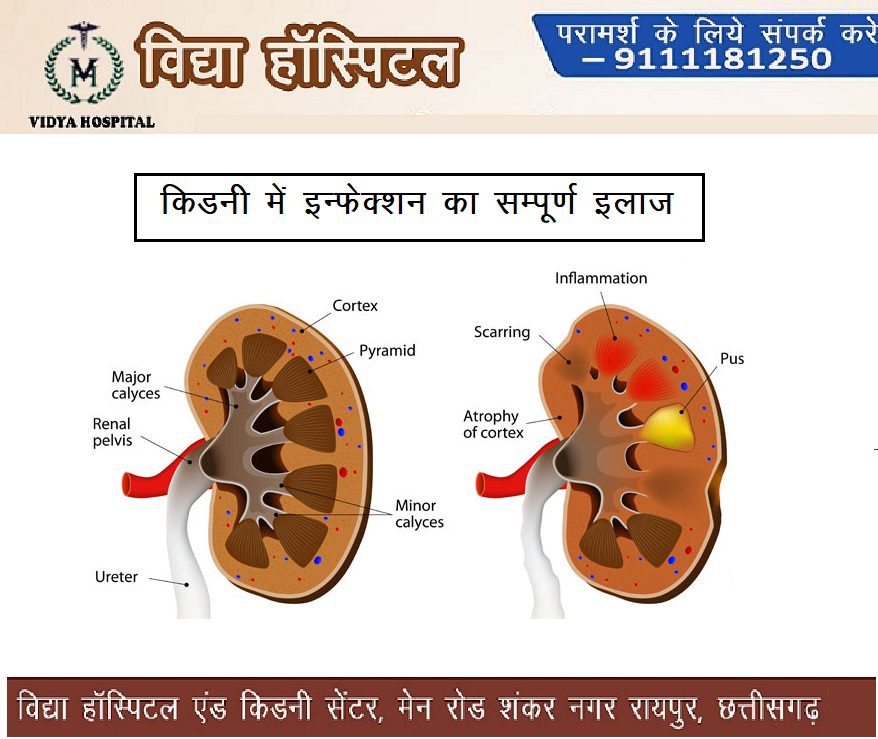Contents
What is kidney infection (pyelonephritis)?
Infection in the urinary tract can involve the lower tract especially the bladder (cystitis), prostate (prostatitis) or the upper tract and kidney (pyelonephritis). It is usually a bacterial infection. It is readily treatable if diagnosed early. A bacteria called Escherichia Coli (E Coli) causes about 90 percent of kidney infections. The bacteria migrate from the genitals through the urethra (the tube that removes urine from the body) into the bladder and up the tubes (ureters) that connect the bladder to the kidneys.
What are the causes of kidney infections (pyelonephritis)?
Normally, bacteria are flushed out by the flow of urine. However, several problems can increase the risk of a kidney infection. These problems can include:
- Structural abnormalities (strictures, stents, stones, surgery) blocking urine flow.
- An enlarged prostate gland (benign prostatic hyperplasia) compressing the urethra.
- Backflow (reflux) of urine from the bladder to the kidneys.
- If your immune system is affected (low white blood cell count, use of certain medications, HIV, cancer, an organ transplant).
- Pregnancy, during which time the enlarging uterus can squeeze the ureters and reduce the flow of urine, allowing the bacteria to migrate to the kidneys.
- Uncontrolled diabetes mellitus.
What are the symptoms of kidney infection?
A number of symptoms can indicate to your doctor that you may have a kidney infection. The more severe the symptoms, the more likely the infection involves the kidney. Symptoms of a kidney infection include:
- Sudden onset of chills
- Fever over 100 degrees Fahrenheit
- Pain in the groin, lower back or side
- Nausea
- Vomiting
- Abdominal muscle spasm
- Painful urination
- Increased urination
- Unproductive attempts to urinate despite feelings of urgency
- General ill feelings
- Cloudy urine
- Abnormally coloured urine
- Blood in the urine
- Foul smelling urine
- If you experience any of these sudden onset symptoms, please seek medical attention.

How are kidney infections (pyelonephritis) diagnosed?
Two common laboratory tests are performed to diagnose kidney infections (pyelonephritis). A urine sample is examined under a microscope to determine if white and/or red blood cells are present. The urine is also sent to the lab to see if bacteria grow in a urine culture. If a person is very sick, blood cultures may also be sent. The strain of bacteria that are cultured will determine the type of therapy used in your treatment. Pyelonephritis can often be treated without X-ray studies, unless your doctor suspects there may be an addition problem. CT scans produce images of structures and organs and these scans are usually done without contrast (dye).
BOOK CONSULTATION WITH THE BEST NEPHROLOGIST IN RAIPUR NOW

OR
EMERGENCY- CALL- 9111181250
24 hour Emergency and Ambulance services available.
How are kidney infections (pyelonephritis) treated?
A physician can start the patient on the standard treatment of a course of antibiotics before the lab tests results are available. If the treatment is effective, the patient should feel better in two to three days. Most antibiotic treatments last for 14 days and it is essential that patients take the pills as recommended for the full 14 days even though symptoms may disappear after a few days. There is also a concern that those bacteria that remain may develop resistance to the medication. For some reason the disease is more difficult to treat in men and they may have to take medication for up to six weeks.
How to avoid kidney infections (pyelonephritis)?
Hydration: It is important to drink adequate fluid (not only water) every day but there is no specific recommendation that applies to every patient.
Urinate completely: When you need to urinate, empty your bladder completely. Holding in your urine can be harmful and can promote the growth of bacteria. Urinating every several hours can help to flush any bacteria out of your body, protecting it from an infection.
Practice good hygiene: Keeping yourself clean can help protect your body from infections. After a bowel movement, wipe from front to back to push bacteria away from the urethra (an opening in the body). This is especially important for women.
What is the outlook for kidney infections (pyelonephritis)?
With treatment, the outlook for kidney infections (pyelonephritis) is very positive. It is vital that you take all of any prescribed medications for the infection. You may begin feeling better shortly after beginning a treatment, but still need to take the entire prescribed treatment.
BOOK CONSULTATION WITH THE BEST NEPHROLOGIST IN RAIPUR NOW
To get more information about Kidney infection (pyelonephritis) use the links below
Vidya hospital and kidney centre
Address: Shankar nagar Main road, Raipur(CG)
Email: [email protected]
Phone: 9111181250, 07714281198,9827197924